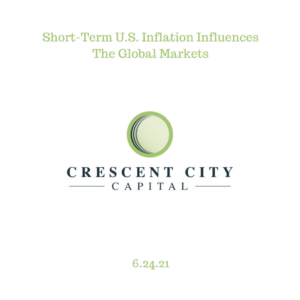Short-Term U.S. Inflation Influences The Global Markets
Written By: Isha Goel | June 24 2021
As COVID-19 cases begin to decline with a rise in vaccinations, an economic reopening has proceeded quicker than Federal Reserve officials anticipated, thus driving inflation higher with it.
A Temporary Rise
In comparison to the usual 2-3 months of heightened inflation, two U.S. Federal Reserve officials claimed on June 23rd that a period of high inflation may last between 6-9 months. This will affect when the central bank begins raising interest rates that were sitting at a near-zero level as a result of the pandemic. At the end of 2020, 12 Fed policymakers had felt that this crisis-level of interest rates would need to sustain through 2024 for better recovery but it appears that this will now move up to late 2022. Atlanta Fed President Raphael Bostic said that growth will likely surge to an estimated 7% this year and inflation will be well above the Fed’s 2% target. He claimed at the central bank’s meeting the previous week that ‘Given the upside surprise in recent data points I pulled forward my projection.’
Rest assured, both Bostic and Fed Governor Michelle Bowman generally agree that recent price increases will prove temporary, but the catch this time is that it may take longer than anticipated for them to fade. Bostic mentioned that ‘temporary is going to be a little longer than we expected initially… Rather than it being two to three months, it may be six to nine months.’ Measures of inflation have been pushed to multi-year highs as a result of prices for goods like lumber and used cars. This has resulted in the consumer price index showing a 5% annualized increase in May, the fastest since 2008. While it is important to note that some prices have begun to ease, this phenomenon has forced the Fed and elected officials to develop a course of action to ensure prices don’t increase too much or too quickly. Bowman said in remarks to a Cleveland Federal Reserve bank conference that she ‘agrees prices are being driven by clogged supply chains and surging demand as the economy reopens, factors that should ease.’ Granted, she mentioned no time frame for this ease so it would need to be closely watched as the Fed sets policy. Over time, they remain optimistic that the economy will hit the 2% inflation target on average.
How Does This Affect Cryptocurrency?
Many investors have begun looking to Bitcoin as an inflationary hedge as liquidity traps intersect with the near-zero interest rates. Billionaires have gone as far as to compare Bitcoin to gold, especially after the recent halving. The crypto derives its value from both speculative interest and its deflationary and controlled money supply. Just like many other coins are built as well, ‘The 21 million Bitcoin limit means that at a certain point, there should be fewer Bitcoins versus the demand for them, meaning that in terms of value, the price per unit should increase as the supply decreases.’
Inflation ultimately means that the value of a certain currency is decreasing and this can become problematic for any nation. El Salvador, the first country to adopt Bitcoin as a legal tender, has taken an assertive approach to tackle this issue in its own country. The country’s President Nayib Bukele claimed that ‘El Salvador is determined to push ahead with making bitcoin legal tender, a process that will bring only small risks and prove a leap forward for humanity.’ He mentioned how this plan would provide the opportunity to lessen El Salvador’s reliance on the U.S. dollar because ‘(We will be) at least becoming a little less dependent on the output of new dollars, and the new inflation that’s coming with those all those new dollars.’
The Impact on the Rest of the World
It has become apparent that the fate of the global economy is closely tied to the performance of the U.S. economy. This week, ‘the central bank’s Federal Open Market Committee suggested that it would probably raise interest rates by a seemingly minor 0.5% in about two years.’ Shortly after the announcement, stocks tumbled in Tokyo and London out of intensified concerns about the rising inflation and worries that preventative measures wouldn’t be taken to control the situation until drastic action might become necessary. The worst-case scenario that most economists worry about is ‘a spike in inflation high enough that the Federal Reserve feels compelled to bring it back down by pushing interest rates high enough to trigger a brief recession.’ Even though a recession would be better than hyperinflation, the movement in the markets makes sense as a result of the Fed’s announcement as investors reassess their risk profile.
Work Cited
Garver, Rob. “US Inflation Worries, However Small, Still Roil Global Markets.” Voice of America, Voice of America, 18 June 2021, www.voanews.com/usa/us-inflation-worries-however-small-still-roil-global-markets.
Huang, Roger. “Bitcoin vs. Inflation.” Forbes, Forbes Magazine, 21 May 2020, www.forbes.com/sites/rogerhuang/2020/05/18/bitcoin-vs-inflation/?sh=2bcadf201c07.
Rugaber, Christopher. “Fed’s Powell Says High Inflation Temporary, Will ‘Wane’.” AP NEWS, Associated Press, 22 June 2021, apnews.com/article/inflation-health-coronavirus-pandemic-business-6e7c813472a3eb706e0cdafe305c1477.
Schneider, Howard. “Fed Officials Say ‘Temporary’ Inflation Surge May Last Longer than Thought.” Reuters, Thomson Reuters, 23 June 2021, www.reuters.com/business/feds-bowman-bottlenecks-high-inflation-may-take-time-ease-2021-06-23/.
Strohecker, Karin, and Tom Arnold. “El Salvador Bitcoin Plan ‘Bulletproof’, President Says.” Reuters, Thomson Reuters, 23 June 2021, www.reuters.com/business/el-salvador-bitcoin-plan-bulletproof-president-says-2021-06-23/.

